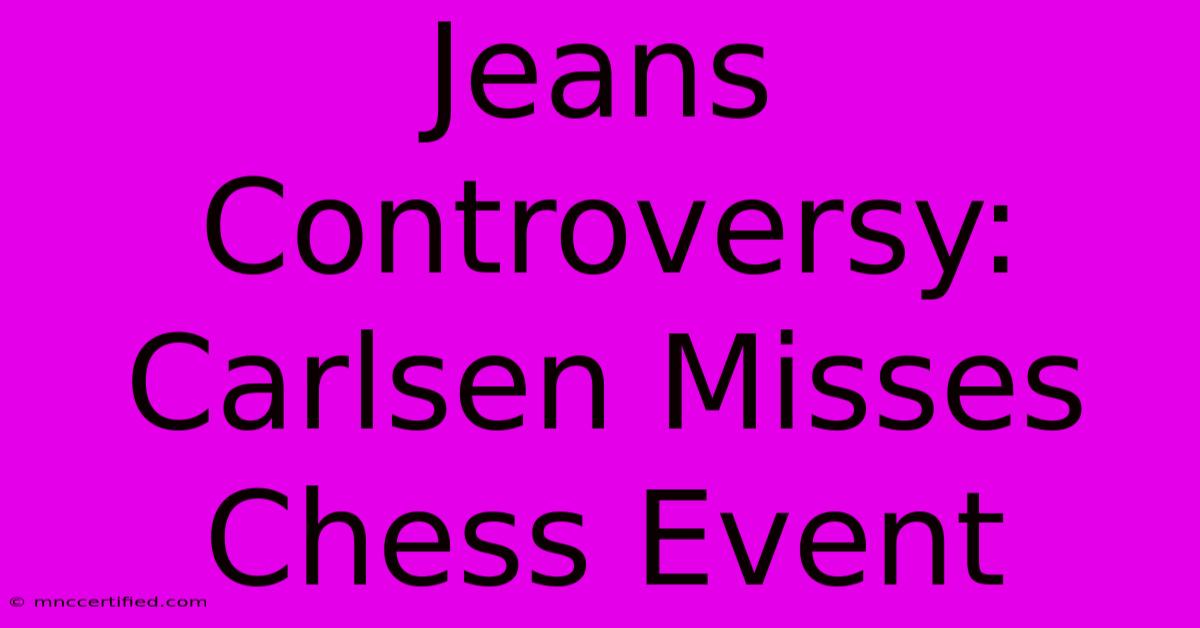Jeans Controversy: Carlsen Misses Chess Event

Table of Contents
Jeans Controversy: Carlsen Misses Chess Event – A Deeper Dive
The chess world is abuzz, not just about the exciting games, but also about a surprising absence and a rather unusual controversy: World Champion Magnus Carlsen's no-show at the prestigious FTX Crypto Cup, and the subsequent speculation linking his absence to a perceived dress code violation. While official statements remain vague, the "jeans controversy" has ignited a firestorm of debate online, touching upon issues of professionalism, personal expression, and the evolving nature of competitive events in the digital age.
The Missing Grandmaster: Carlsen's Absence Sparks Speculation
Magnus Carlsen, a name synonymous with chess mastery, surprisingly skipped the FTX Crypto Cup, a high-profile online chess tournament. His absence wasn't announced beforehand, leaving fans and commentators scrambling for explanations. Initial reports suggested scheduling conflicts or personal matters, but whispers of a deeper issue quickly surfaced.
The Dress Code Debate: Jeans vs. Tournament Standards
The heart of the controversy appears to be centered around an alleged dress code violation. Although no official dress code was explicitly stated, rumors circulated that Carlsen's choice of attire—reportedly jeans—was deemed inappropriate for the event's online broadcast. This sparked heated discussions on social media, dividing opinions on what constitutes professional attire in the context of a digital chess tournament. Many argue that the informal setting of an online event renders traditional dress codes obsolete. Others contend that maintaining a certain level of professionalism, even online, is crucial for upholding the integrity of the game.
Professionalism in the Digital Age: Redefining Norms
This incident raises important questions about professionalism in the digital age. With online events increasingly dominating various fields, traditional norms are being challenged and redefined. The lines between casual and professional settings are blurring, making dress code expectations more ambiguous than ever before. The Carlsen situation highlights this challenge, forcing us to consider whether a strict adherence to conventional standards remains relevant in the digital sphere.
Adapting to Online Platforms: Flexibility vs. Standards
The debate surrounding Carlsen's potential dress code infringement also points to the need for greater clarity and flexibility in the rules and regulations of online tournaments. Tournament organizers must adapt to the unique characteristics of the online environment and strike a balance between maintaining professional standards and allowing for reasonable flexibility in attire. Rigid dress codes, especially in virtual spaces, may feel outdated and alienating to participants.
The Future of Online Chess: Implications and Lessons Learned
The "jeans controversy" serves as a valuable case study for the future of online chess and, more broadly, online competitive events. It underscores the importance of:
- Clear Communication: Openly communicating dress code expectations (or the lack thereof) can prevent misunderstandings and potential controversies.
- Adaptability: Rules and regulations need to adapt to the ever-evolving digital landscape. What might be appropriate for an in-person event may not be suitable for an online one.
- Respect for Individuality: While maintaining professional standards is important, respecting individual expression within reasonable limits is equally crucial.
Ultimately, the Carlsen incident, however seemingly trivial, provides a lens through which to examine broader issues of professionalism, adaptability, and communication in the digital age. The incident sparked a necessary conversation that will likely shape the future of online competitive events across various disciplines. The question remains: Will the chess world find a way to balance tradition with the dynamic realities of the digital realm?

Thank you for visiting our website wich cover about Jeans Controversy: Carlsen Misses Chess Event. We hope the information provided has been useful to you. Feel free to contact us if you have any questions or need further assistance. See you next time and dont miss to bookmark.
Featured Posts
-
Dayle Haddon Model Dies In Carbon Monoxide Leak
Dec 29, 2024
-
Fight Leads To Nurkic Marshall Suspensions
Dec 29, 2024
-
Saying Goodbye To A Toxic Friend
Dec 29, 2024
-
Dayle Haddon Actress Model Dies
Dec 29, 2024
-
Real Madrids Pursuit Of Alexander Arnold
Dec 29, 2024